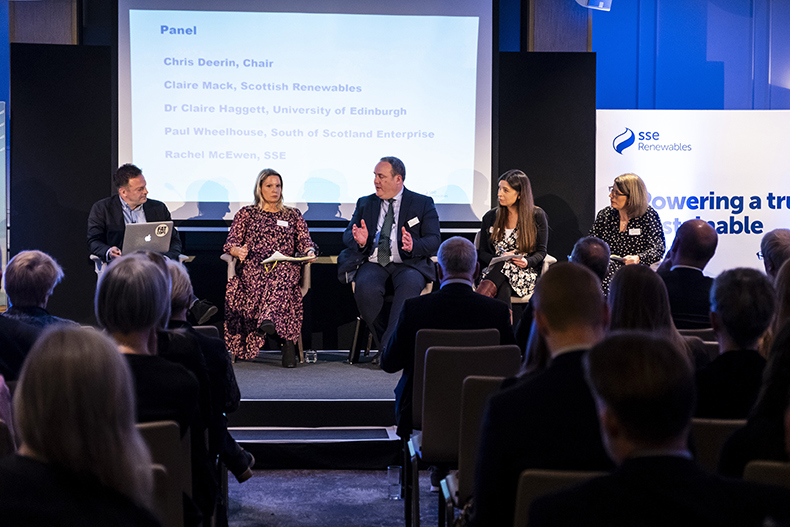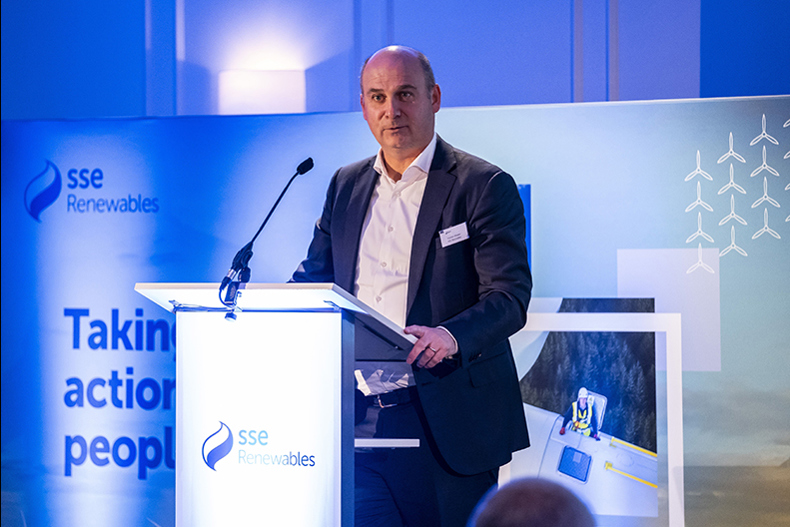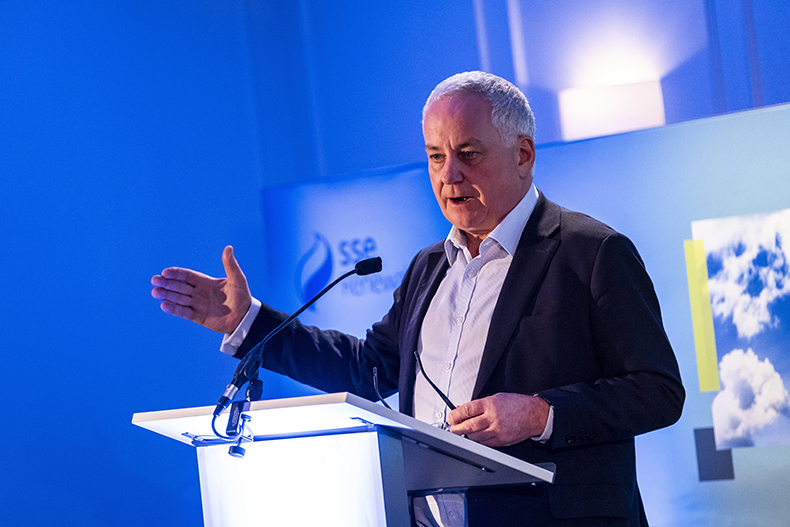SSE Renewables celebrates a decade of powering change in local communities
27 Nov 2023Since 2013 Sustainable Development Fund has invested £13.5m so far across 238 community projects in Scotland
Wind-powered fund expected to disburse at least £57m in funding across Scotland over 25-year lifetime of each contributing wind farm
Celebratory event hosted in Edinburgh with community groups and key industry bodies
SSE Renewables has celebrated ten years of its flagship regional Sustainable Development Fund (SDF) for Scotland at a celebratory event in Edinburgh.
Since it was established in 2013, the wind-powered Sustainable Development Fund has invested more than £13.5m so far across 238 community projects in Scotland. Funds disbursed by the SDF come from SSE Renewables’ onshore wind farms in five local authority areas, with annual contributions made to the fund from each wind farm during its expected operational lifetime of around 25 years.
Currently, it’s estimated the SSE Renewables-backed fund will contribute at least £57m to regional development across Scotland over the next two decades. This figure, and the life expectancy of the fund, will grow as SSE Renewables delivers more new onshore wind farms across Scotland.

Left to right, A panel discussion chaired by Chris Deerin of Reform Scotland, with contributions from Claire Mack, Scottish Renewables, Paul Wheelhouse, South of Scotland Enterprise, Dr Claire Haggett, Edinburgh University, and Rachel McEwen, SSE’s Chief Sustainability Officer.
Over the last decade, the Sustainable Development Fund has helped communities overcome significant challenges by supporting projects to reduce extreme poverty, reverse depopulation, and deliver social support. It has also supported efforts to enable rural areas to capitalise on their strengths, from enhancing biodiversity to increasing skills and celebrating local cultural heritage.
SSE Renewables established the SDF to help share the benefits of its onshore wind farms with wider regional communities, beyond those closest to its renewable assets. The fund typically provides an investment of £2,500 per MW of installed capacity from onshore wind farms in Scotland to community projects in the Highland, South Lanarkshire, Perth and Kinross, Scottish Borders and Dumfries and Galloway local authority regions.
Decisions on awards from the fund are made by an expert panel to ensure the projects supported are those likely to provide a legacy in each region. The panel, chaired by former First Minister of Scotland, Lord Jack McConnell, focuses on projects that demonstrate clear evidence of need, community involvement, and financial viability. Successful projects should also offer long-term positive impact as well as make a contribution to Scotland’s transition to net zero.
Marking the celebration, Stephen Wheeler, Managing Director for SSE Renewables said:
“The transition to net zero must be a fair and just one, and we have to work together with communities, ensuring we’re delivering tangible, long-term benefits for them. For SSE Renewables, community funding has always been a central part of this. We’re hugely proud of the contributions we’ve made to local groups and initiatives in the immediate vicinity of our wind farms, as well as in wider regions.
“We were the first renewables developer to take a regional approach to community funds in Scotland, and since the launch ten years ago, the Sustainable Development Fund has made a significant impact for local communities.
“I am proud that 96% of projects supported by the Sustainable Development Fund are still in operation and making a positive difference to people’s lives.”
The celebratory event at the Hilton Carlton in Edinburgh brought together representatives from various community project groups that have benefitted from the SDF, as well as guests from key industry bodies. The event included speeches from Stephen Wheeler on behalf of SSE Renewables alongside the Chair of the Sustainable Development Fund Panel, Lord McConnell of Glenscorrodale.
A panel discussion considered the next decade of community impact from renewable energy, and was chaired by Chris Deerin of Reform Scotland, with contributions from Claire Mack, Scottish Renewables, Dr Claire Haggett, Edinburgh University, Paul Wheelhouse, South of Scotland Enterprise, and Rachel McEwen, SSE’s Chief Sustainability Officer.

Lord Jack McConnell, Chair of the Sustainable Development Fund, said:
“For a decade, SSE Renewables has acted to ensure that low-carbon infrastructure has a positive impact on the regions in which their assets exist. Its Sustainable Development Fund is making a lasting difference to the social and economic development of communities across Scotland.
“I have been really impressed by the way people across Scotland have adapted and embraced the transition to net zero, and I am sure the Sustainable Development Fund will continue to empower and improve communities across the country in the years to come.”
Among the community causes to have benefited from the SSE Renewables Sustainable Development Fund are The University of Highlands and Islands, whose STEM (Science, Technology, Engineering, and Maths) project supported the enhancement of STEM education and attainment across the Highlands.
UHI received funding to bring about a culture change within Highland schools by increasing confidence in STEM teaching and embedding STEM-related principles in learning across the curriculum. The project provided teacher training, learning resources, peer learning, and additional skills development for probationary teachers. An independent evaluation by Ekosgen highlighted the success of the project, including in reaching rural and remote schools and providing a “whole school” approach to STEM learning.

Councillor John Finlayson, Chair of The Highland Council’s Education Committee, said:
“The STEM outreach project was a huge success in Highland. I believe it has helped to build STEM capacity and confidence amongst students and teachers across the region.”
In South Lanarkshire, LEAP Enterprise Scotland Community Interest Company received a grant which helped the organisation transform a derelict site in the heart of Cambuslang into a thriving community learning and climate action hub, ‘The Inspiration Station’.
The hub includes a community café, a learning suite, a community garden, and a re-use shop. It enables the community to re-use and recycle textiles by engaging them in swapping, sharing, mending and repair activities. The learning suite has helped local people re-engage with each other and with climate action after the Covid-19 pandemic. It provides over 400 sessions a year in activities such as sewing, knitting, craft and gardening.
Wendy Russell, Social Enterprise Development Manager, LEAP Enterprise Scotland CIC, said:
“SSE Renewables put their trust in voluntary organisations to deliver. Funders like SSE Renewables should be highlighted for their good practice in supporting and nurturing good work.”
You can read the SSE Renewables Sustainable Development Fund Review here.


